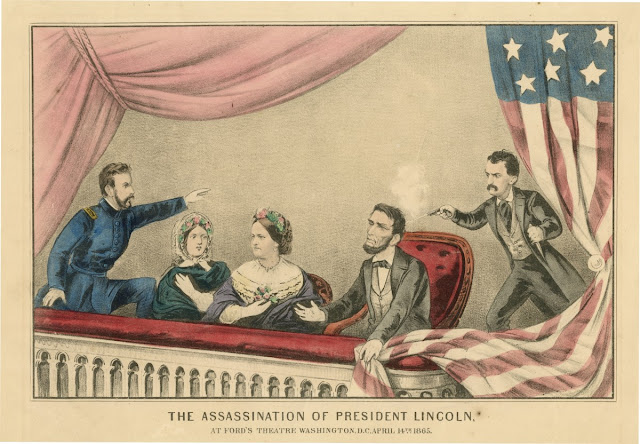April 14, 1865: President Abraham Lincoln is shot by John Wilkes Booth at Ford's Threatre
The president rose in high spirits on the morning of April
14, 1865. He had many reasons to be in such a good mood. The Army of Northern
Virginia had surrendered to Union forces only five days prior, and the war
seemed to be coming to a swift end. The President busied himself with the tasks
of the day, but he could not wait to get to the telegraph office that night to
see the latest dispatches from the front. The First Lady had a different evening
in mind. She wanted to go to the theatre for a night of leisure. She bought tickets
to see the popular comedic play, Our American Cousin at Ford’s Theatre. The
tired President reluctantly agreed. Originally the Lincolns invited General
Grant to attend but he refused, wanting to see family instead. They settled on
their friend, Major Henry Rathbone and his fiancée, Clara Harris. As the Lincolns
busied themselves in the arrangements, two miles away, John Wilkes Booth was
drinking his woes away in a local tavern.
The Civil War was a tough time for the actor. While Booth was
in the militia at the beginning of the war, he chose not to fight for the Confederacy.
By the war’s end, he had become a virulent southern extremist, and an ardent
white supremacist. As Lincoln moved toward a policy of emancipation, Booth
sought to prevent it. He was joined by Samuel Arnold, George Atzerodt, David Herold,
Michael O’Laughlen, Lewis Powell, and John Surratt. The conspirators sought to kidnap
the President and ransom him for Confederate prisoners. On March 19, they decided
to enact their plot as Lincoln was coming from a play at the Campbell Military
Hospital. However, he never attended and the plot failed. Booth then decided he
had to kill the President, he only had to find his chance. On April 14, he sat
in a tavern sadly sipping his brandy.
After he finished his drink, he traveled to Ford’s Theatre
to pick up his mail. As he sorted his mail, he spoke with the theatre’s owner.
He told Booth that the Lincolns were suppose to attend a play that night. Booth
had found his chance. He waited for the President in a tavern across the street
from the theatre. The Presidential party arrived late, quickly taking their
seats. Lincoln’s guard, a policeman named John Frederick Parker was absent, now
occupying the same bar Booth was at. Booth slowly made his way to the President’s
box. He entered, barricading the door behind him. He drew his derringer from
his pocket. He waited until the audience’s biggest laugh, and fired his gun inches
from the back of the President’s head. Mary Todd yelled in horror and President
slumped down. Major Rathbone leaped up and grabbed Booth but recoiled when he
slashed him with his knife. Booth leaped out of the box onto the stage below.
He fell with a thud, as his boot spur was caught in the flag that hung from the
box. As he limped toward the exit, he either said, “Sic semper tyrannis” (always
thus to tyrants), or “The South is avenged” to the stunned audience. He stumbled
to the exit and onto a waiting horse, galloping into the dark, Virginia mist.
The President clung to life, as he laid bleeding on the
floor of the box. He was breathing extremely heavy. A doctor from the audience
ran up to the box to aid the wounded President. He felt around the back of the
President’s head until he found a hole. He stuck his finger into the wound to
relieve a clot., returning his breathing back to normal. Soldiers came to take
the dying President across the street to the Peterson House. They placed him on
the bed and covered him in blankets. Throughout the night, he struggled for
life. That night would prove to the most desperate in the history of the young
country. As the President laid in semi-comatose state, the government was being
attacked from all sides. The Secretary of State, William Seward had been
brutally attacked in his home, but had luckily survived. The Vice President was
targeted but his assassin developed cold feet. The man left in sole control of
the government was Secretary of War, Edwin Stanton. He made sure to shut down
the city and establish a dragnet to capture the fugitive Booth. As the night
progressed, the President grew worse. His breathing grew shallow. When the sun rose
that morning, it had stopped. Abraham Lincoln died that morning, surrounded by
the men he had once considered rivals. Now these men would remember him as the
President who preserved the Union in the face of unsurmountable odds.




Comments
Post a Comment